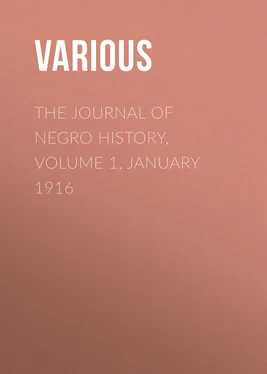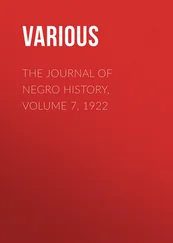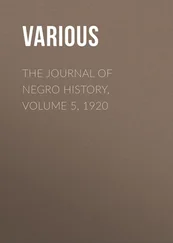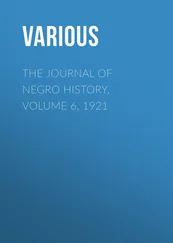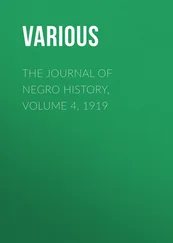Various - The Journal of Negro History, Volume 1, January 1916
Здесь есть возможность читать онлайн «Various - The Journal of Negro History, Volume 1, January 1916» — ознакомительный отрывок электронной книги совершенно бесплатно, а после прочтения отрывка купить полную версию. В некоторых случаях можно слушать аудио, скачать через торрент в формате fb2 и присутствует краткое содержание. Жанр: foreign_antique, periodic, История, foreign_edu, на английском языке. Описание произведения, (предисловие) а так же отзывы посетителей доступны на портале библиотеки ЛибКат.
- Название:The Journal of Negro History, Volume 1, January 1916
- Автор:
- Жанр:
- Год:неизвестен
- ISBN:нет данных
- Рейтинг книги:5 / 5. Голосов: 1
-
Избранное:Добавить в избранное
- Отзывы:
-
Ваша оценка:
- 100
- 1
- 2
- 3
- 4
- 5
The Journal of Negro History, Volume 1, January 1916: краткое содержание, описание и аннотация
Предлагаем к чтению аннотацию, описание, краткое содержание или предисловие (зависит от того, что написал сам автор книги «The Journal of Negro History, Volume 1, January 1916»). Если вы не нашли необходимую информацию о книге — напишите в комментариях, мы постараемся отыскать её.
The Journal of Negro History, Volume 1, January 1916 — читать онлайн ознакомительный отрывок
Ниже представлен текст книги, разбитый по страницам. Система сохранения места последней прочитанной страницы, позволяет с удобством читать онлайн бесплатно книгу «The Journal of Negro History, Volume 1, January 1916», без необходимости каждый раз заново искать на чём Вы остановились. Поставьте закладку, и сможете в любой момент перейти на страницу, на которой закончили чтение.
Интервал:
Закладка:
All of the colonies thereafter tended to look more favorably upon the enlistment of colored troops. Free Negroes enlisted in Virginia and so many slaves deserted their masters for the army that the State enacted in 1777 a law providing that no Negro should be enlisted unless he had a certificate of freedom. 138That commonwealth, however, soon took another step toward greater recognition of the rights of the Negroes who desired to be free to help maintain the honor of the State. With the promise of freedom for military service many slaves were sent to the army as substitutes for freemen. The effort of inhuman masters to force such Negroes back into slavery at the close of their service at the front actuated the liberal legislators of that commonwealth to pass the Act of Emancipation, proclaiming freedom to all Negroes who had thus enlisted and served their term faithfully, and empowered them to sue in forma pauperis , should they thereafter be unlawfully held in bondage. 139
In the course of time there arose an urgent need for the Negro in the army. The army reached the point when almost all sorts of soldiers were acceptable. In 1778 General Varnum induced General Washington to send certain officers from Valley Forge to Rhode Island to enlist a battalion of Negroes to fill the depleted ranks of that State. 140Setting forth in the preamble that "history affords us frequent precedents of the wisest, freest and bravest nations having liberated their slaves and enlisted them as soldiers to fight in defense of their country," the Rhode Island Assembly resolved to raise a regiment of slaves, who were to be freed upon their enlistment, their owners to be paid by the State according to the valuation of a committee. Further light was thrown upon this action in the statement of Governor Cooke, who in reporting the action of the Assembly to Washington boasted that liberty was given to every effective slave to don the uniform and that upon his passing muster he became absolutely free and entitled to all the wages, bounties and encouragements given to any other soldier. 141
The State of New Hampshire enlisted Negroes and gave to those who served three years the same bounty offered others. This bounty was turned over to their masters as the price of the slaves in return for which their owners issued bills of sale and certificates of freedom. 142In this way slavery practically passed out in New Hampshire. This affair did not proceed so smoothly as this in Massachusetts. In 1778 that legislature had a committee report in favor of raising a regiment of mulattoes and Negroes. This action was taken as a result upon receiving an urgent letter from Thomas Kench, a member of an artillery regiment serving on Castle Island. Kench referred to the fact that there were divers of Negroes in the battalions mixed with white men, but he thought that the blacks would have a better esprit de corps should they be organized in companies by themselves. But the feeling that slaves should not fight the battles of freemen and a confusion of the question of enlistment with that of emancipation for which Massachusetts was not then prepared, 143led to a heated debate in the Massachusetts Council and finally to blows in the coffee houses in lower Boston. In such an excited state of affairs no further action was taken. Finding recruiting difficult it is said that Connecticut undertook to raise a colored regiment 144and in 1781 New York, offering the usual land bounty which would go to the masters to purchase the slaves, promised freedom to all slaves who would enlist for the time of three years. 145Maryland provided in 1780 that each unit of £16,000 of property should furnish one recruit who might be either a freeman or a slave, and in 1781 resolved to raise 750 Negroes to be incorporated with the other troops. 146
Farther South the enlistment of Negroes had met with obstacles. The best provision the Southern legislatures had been able to make was to provide in addition to the allotment of money and land that a person offering to fight for the country should have "one sound Negro" 147or a "healthy sound Negro" 148as the laws provided in Virginia and South Carolina respectively. Threatened with invasion in 1779, however, the Southern States were finally compelled to consider this matter more seriously. 149The Continental Army had been called upon to cope with the situation but had no force available for service in those parts. The three battalions of North Carolina troops, then on duty in the South, consisted of drafts from the militia for nine months, which would expire before the end of the campaign. What were they to do then when this militia, which could not be uniformly kept up, should grow impatient with the service? Writing from the headquarters of the army at this time, Alexander Hamilton in discussing the advisability of this plan doubtless voiced the sentiment of the staff. He thought that Colonel Laurens's plan for raising three or four battalions of emancipated Negroes was the most rational one that could be adopted in that state of Southern affairs. Hamilton foresaw the opposition from prejudice and self-interest, but insisted that if the Americans did not make such a use of the Negroes, the British would.
The movement received further impetus when special envoys from South Carolina headed by Huger appeared before the Continental Congress on March 29, 1779, to impress upon that body the necessity of doing something to relieve the Southern colonies. South Carolina, they reported, was suffering from an exposed condition in that the number of slaves being larger than that of the whites, she was unable to effect anything for its defense with the natives, because of the large number necessary to remain at home to prevent insurrections among the Negroes and their desertion to the enemy. These representatives, therefore, suggested that there might be raised among the Negroes in that State a force "which would not only be formidable to the enemy from their numbers and the discipline of which they would readily admit but would also lessen the danger from revolts and desertions by detaching the most vigorous and enterprising from among the Negroes." At the same time the Committee expressed the opinion that a matter of such vital interest to the two States concerned should be referred to their legislative bodies to judge as to the expediency of taking this step, and that if these commonwealths found it satisfactory that the United States should defray the expenses.
Конец ознакомительного фрагмента.
Текст предоставлен ООО «ЛитРес».
Прочитайте эту книгу целиком, купив полную легальную версию на ЛитРес.
Безопасно оплатить книгу можно банковской картой Visa, MasterCard, Maestro, со счета мобильного телефона, с платежного терминала, в салоне МТС или Связной, через PayPal, WebMoney, Яндекс.Деньги, QIWI Кошелек, бонусными картами или другим удобным Вам способом.
1
Quillin, "The Color Line in Ohio," 18.
2
"Tyrannical Libertymen," 10-11; Locke, "Antislavery," 31-32; Branagan, "Serious Remonstrance," 18.
3
Woodson, "The Education of the Negro Prior to 1861," 230-231.
4
Constitution, Article I, Sections 2, 6.
5
Laws of Ohio, II, 63.
6
Laws of Ohio, V, 53.
7
Интервал:
Закладка:
Похожие книги на «The Journal of Negro History, Volume 1, January 1916»
Представляем Вашему вниманию похожие книги на «The Journal of Negro History, Volume 1, January 1916» списком для выбора. Мы отобрали схожую по названию и смыслу литературу в надежде предоставить читателям больше вариантов отыскать новые, интересные, ещё непрочитанные произведения.
Обсуждение, отзывы о книге «The Journal of Negro History, Volume 1, January 1916» и просто собственные мнения читателей. Оставьте ваши комментарии, напишите, что Вы думаете о произведении, его смысле или главных героях. Укажите что конкретно понравилось, а что нет, и почему Вы так считаете.
